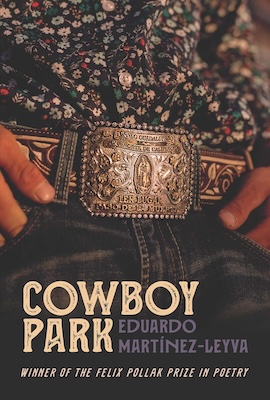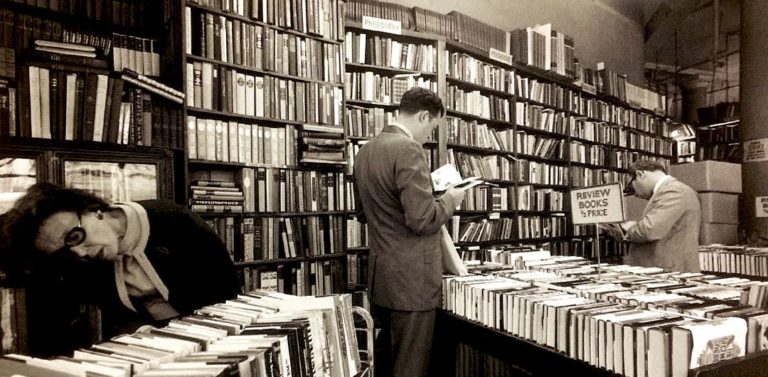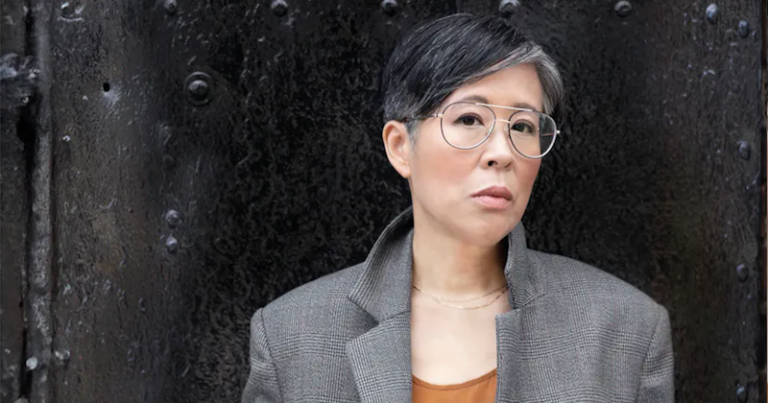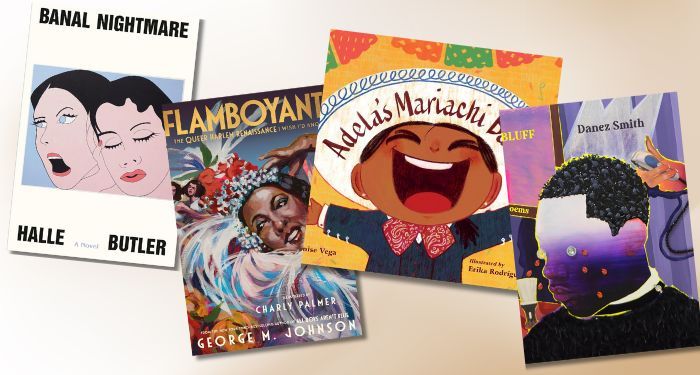Over a decade has passed since I traded the sunny, desert landscape of El Paso, Texas, for the vibrant chaos of East Coast city life. And no matter the distance, all roads lead back to Texas, my compass, guiding me home.
Although much has been said about The Texas-Mexico border, for me, it contains multitudes: it is home, my community, my comfort, and my voice—a voice resonating alongside diverse storytellers who have deeply shaped and inspired me. This connection was especially profound when I wrote my debut poetry collection, Cowboy Park, which reflects on my upbringing in a place often misrepresented. The collection honors those who influenced me and the writers who came before me. In moments of doubt or homesickness, I turn to these poets to anchor my identity as a Tejano, a Mexican-American from the Lone Star State. In one way or another, each collection is committed to revealing painful truths and uncovering beauty within them. Their work has ignited my passion to write my truths—a calling that feels more urgent now than ever. Our stories as writers of color enrich the literary world, and these poets have paved the way for me to share my own.
Borderlands: La Frontera by Gloria Anzaldúa
In the pantheon of Texas writers, the goddess watching over us all is the incomparable Gloria Anzaldúa. Her magnum opus, Borderlands: La Frontera, is a sacred text for any writer, especially those of us who identify as queer. Born in the Rio Grande Valley, this Chicana feminist weaves her lived experiences into both prose and poetry. Anzaldua’s forward-thinking work remains timeless, challenging concepts of binaries, physical and mental borders, and gender roles. Anzaldua was one of the first writers where I truly saw myself reflected in her words, hearing an amalgamation of English, Spanish, and Spanglish. Her unapologetic code-switching defies labels like “pocha” Instead, she embraces these polarities, this split self, subverting expectations of what it means to be wholly Mexican or American. Reading her work empowers me, reminding me that dual and hybrid language are integral to who I am and the culture that raised me, as vital as any academic diction. Her work offers solace and understanding of existing as a hybrid individual. As she puts it: “To survive the Borderlands/you must live sin fronteras/be a crossroads.” Discovering her work was like unearthing a family heirloom. I am lucky to feel part of her kin, and I hope to make her proud. She is truly a treasure, the mother to us all, our glory, our Gloria, nuestra Gloria.
Horse in the Dark by Vievee Francis
In this collection, Francis captures the essence of the Texas landscape with raw and radiant elements. Her descriptive lines, vernacular, and imagery create a tangible mythology, blending grit with whimsy. I appreciate her use of several Texas symbols—pepper sauce, horses, or even a Conoco station—because she elevates the ordinary, making it significant and beautiful. Francis’ keen attention to detail enlivens each poem. Through unexpected pairings and rhythmic repetition, she transports readers into a world where transformation is possible. In one poem, a speaker becomes a horse, while another explores the haunting echoes of gun violence with lyrical incantation. “What you can’t forget—you tell—or die in it.” I couldn’t agree more with this line. This unforgettable truth underscores her powerful voice of witness, ritual, and confession. Rather than merely telling stories, Francis conjures them, inviting us to explore the magical alongside the familiar, encouraging us to believe in the impossible. Her work showcases poetry’s ability to reshape perceptions and highlight the extraordinary in everyday life.
Beast Meridian by Vanessa Angelica Villareal
Vanessa Angélica Villareal’s Beast Meridian is a shape-shifting force of nature. This hybrid collection merges confessional poetry, experimental line structure, lyricism, photography, and portraits, making it a visually striking and collage-like book. Villareal’s work was unlike anything I had seen before, capturing the reader’s attention and never letting go. She reveals her most intimate moments with unflinching honesty. Take, for instance, the poem “Escape, a Waxwing Migration,” where she writes, “The men who love you have a backhand for every desire,” or the vivid enumerations in “A Field of Onions: Brown Study,” where she states, “To panic is to feel all your wildness at once.” Each poem is its own entity, a universe or constellation of powerful hurt, creating a world I slip into, empathize, and dwell in. What I admire most is the pure candor and vulnerability in this book. Villareal lays bare her life and heart, inviting us to see and experience it. The emotion she creates is striking and timeless, precisely because of her openness. Her work inspires me to take risks, to keep questioning, to be bold–gutsy.
Thrown in the Throat by Benjamin Garcia
There is nothing coy about this collection. Winner of the National Book Poetry Prize, Ben’s bold, in-your-face, poetry throws caution to the wind by defying conventions. His playful diction captures a voice that is passionate, confident, sexy, and a little dangerous. Garcia’s flexibility with language and grammar feels like an act of defiance, experimenting with form, language, and punctuation shows his daring move not to follow any traditions or conventions and instead reshaping them. The sonics throughout the collection calls out like a siren, seducing us into a realm of queer excellence, fierceness, and some trepidations. “this Mary is her own // talking bouquet//never let a man speak for you or call you // what he wants // I learned that the hard way // amorphophallus titanum // it sure sounds pretty in a dead tongue.” Garcia’s lush language is packed with several twists of the tongue and whips of the wrist. It is an inspiration because of its daring movements and refusal to kneel to the norm, carving a new path for others to follow. I must confess, I am a little jealous of his work because it challenges societal norms by exalting the voices of BIPOC queer folks. Garcia reshapes our understanding of queer identity. The true definition of a chingón. He raises the bar with this book.
Lima: Limon by Natalie Scenters-Zapico
Every story has two sides, including those less often spoken about in writing. Natalie Scenters-Zapico defies this notion in her riveting second collection, Lima: Limon. It’s a book about doubling—the domestic versus the public, and how beauty can’t exist without its counterpart. Lima: Limon explores themes of marianismo and machismo, highlighting the grip these flawed societal concepts have on the Latinx community: “Each husband takes a piece of my body home with them in every limón. A piece of my body they can slice into quarters & squeeze into their beer.” As a fellow “paisana” from El Paso, Natalie invites us to look deeper, to see the shadows and lights, the violence imposed on those living on the border. Candid and fearless, this collection is indelible; her poems leave a mark—a faded scar I occasionally outline around my body. It’s a reminder of the world I lived in, often ignored or misconstrued by the media. Reading Natalie’s books teaches me the importance of being vulnerable and unapologetic. Her work continually inspires me to push boundaries without guilt. It documents life and death. Without her voice, I wouldn’t be as courageous, both on and off the page.
How to Kill a Goat and Other Monsters by Saúl Hernández
Saúl Hernández’s How to Kill a Goat and Other Monsters captivates through its use of storytelling and compelling lines full of gorgeous texture. The book is a tapestry of complexity and richness, deeply personal and heartfelt. Set against the backdrop of the Rio Grande region and El Paso, the collection delves into themes of queerness, familial ties, and the impact of living in a highly militarized environment. The speaker’s journey of self-discovery is poignant, as he grapples with identity and learns self-kindness amidst adversity. His words echo with tenderness, familial bonds, and tragedy: “I unravel petals all day with my tongue, I tease a boy telling him I don’t like anything in me unless it’s love.” The poems explore the physical and emotional toll of violence, with the haunting loss of an uncle weaving through the narrative. Hernández’s lines are exquisite, full of mystery and heartache, drawing readers into a hypnotic dance before delivering their delicate but powerful impact. Hernández’s work transforms personal pain into a narrative of empowerment.
Dreaming the End of the War by Benjamin Alire Sáenz
This list wouldn’t be complete without “el maestro” himself, Benjamin Alire Sáenz. A New Mexico native who has made El Paso his home for years. Dreaming of the End of War continues to resonate, given our current political climate, with its riveting storytelling and painful honesty. It’s a book about displacement in every sense, urging us to interrogate our society by first examining our own personal battles. It reflects on and exercises how to be empathetic. There is something Whitmanesque about these poems: “I am the man… I am the busboy… I am a boy… I am walking in the desert. I see that I am reaching a border. A bullet is piercing my heart.” Dreaming the End of the War challenges us to confront our difficult truths.
The post 7 Poetry Collections by BIPOC Texas Writers appeared first on Electric Literature.













 Bengali (Bangladesh) ·
Bengali (Bangladesh) ·  English (United States) ·
English (United States) ·